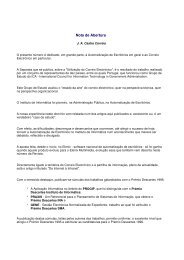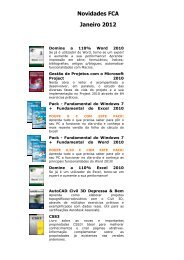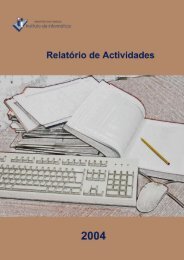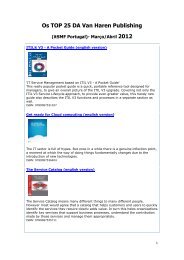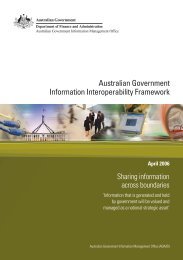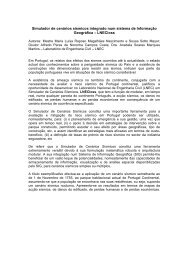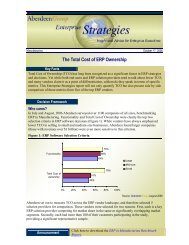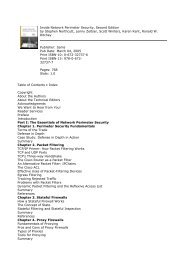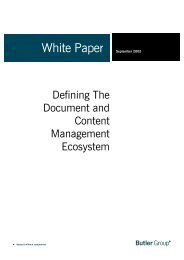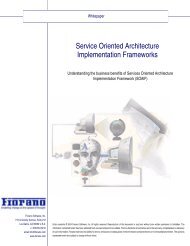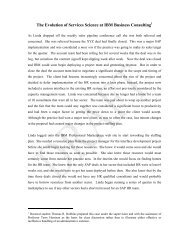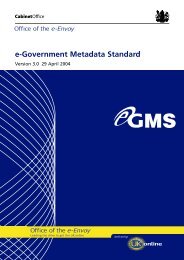OECD Peer Review of E-Government in Denmark - ePractice.eu
OECD Peer Review of E-Government in Denmark - ePractice.eu
OECD Peer Review of E-Government in Denmark - ePractice.eu
Create successful ePaper yourself
Turn your PDF publications into a flip-book with our unique Google optimized e-Paper software.
Figure 5.1 Impact <strong>of</strong> e-government on organisations<br />
Information and knowledge shar<strong>in</strong>g<br />
Change <strong>in</strong> your organisation's front-<strong>of</strong>fice bus<strong>in</strong>esses processes<br />
Change <strong>in</strong> your organisation's back-<strong>of</strong>fice bus<strong>in</strong>esses processes<br />
Change <strong>in</strong> skills<br />
Transparency (e.g. open and clear processes)<br />
Motivation <strong>of</strong> personnel<br />
Def<strong>in</strong>ition <strong>of</strong> functions and responsibilities<br />
More open/flexible organisational culture<br />
Reduction <strong>of</strong> staff costs<br />
Accountability and responsibility<br />
Reduction <strong>in</strong> the amount <strong>of</strong> hierarchy<br />
Decisions to outsource activities<br />
Partner<strong>in</strong>g arrangements with<strong>in</strong> government<br />
Decisions to establish public-private partnerships<br />
0% 10% 20% 30% 40% 50% 60% 70% 80% 90% 100%<br />
Significant positive impact Some positive impact No impact/n<strong>eu</strong>tral impact Some negative impact Significant negative impact<br />
Source: <strong>OECD</strong> E-<strong>Government</strong> Survey: <strong>Denmark</strong>.<br />
Impact on <strong>in</strong>formation and knowledge shar<strong>in</strong>g<br />
Like many <strong>OECD</strong> countries, <strong>Denmark</strong> has recognised the impact ICT can have on enhanc<strong>in</strong>g<br />
<strong>in</strong>formation shar<strong>in</strong>g, both with<strong>in</strong> organisations and across government, through elim<strong>in</strong>at<strong>in</strong>g physical<br />
barriers to communication and reduc<strong>in</strong>g the cost associated with <strong>in</strong>formation shar<strong>in</strong>g. As shown <strong>in</strong> the<br />
figure above, this is the area where survey respondents felt that e-government has had the greatest<br />
impact on their organisations so far.<br />
However, while the current e-government strategy identifies <strong>in</strong>formation and knowledge shar<strong>in</strong>g<br />
as a key area <strong>of</strong> focus <strong>in</strong> creat<strong>in</strong>g the framework for ongo<strong>in</strong>g development <strong>of</strong> e-government, it does not<br />
specifically address the use <strong>of</strong> ICT as a tool to promote shar<strong>in</strong>g <strong>of</strong> <strong>in</strong>formation or knowledge (either<br />
about e-government or about the wider bus<strong>in</strong>ess <strong>of</strong> government) across government. While the<br />
strategy does <strong>in</strong>clude the goal <strong>of</strong> improv<strong>in</strong>g the systematic shar<strong>in</strong>g <strong>of</strong> lessons learned regard<strong>in</strong>g<br />
suppliers, f<strong>in</strong>ance, organisational change and human resources <strong>in</strong> order to build a solid body <strong>of</strong><br />
e-government knowledge across government, it does not <strong>in</strong>clude any explicit measures to provide the<br />
public sector with some form <strong>of</strong> government-wide electronically enabled knowledge-shar<strong>in</strong>g<br />
framework (e.g. a def<strong>in</strong>ed <strong>in</strong>formation and/or knowledge management strategy, a public sector<br />
Intranet, or a common electronic workspace us<strong>in</strong>g onl<strong>in</strong>e collaboration tools). This is an area to which<br />
more effort could perhaps be devoted, build<strong>in</strong>g on a pr<strong>in</strong>ciple that all organisations <strong>in</strong>volved <strong>in</strong><br />
e-government development <strong>in</strong> <strong>Denmark</strong> should take responsibility for promot<strong>in</strong>g the ICT-enabled<br />
exchange <strong>of</strong> <strong>in</strong>formation and knowledge; both that specific to e-government projects and <strong>in</strong>itiatives,<br />
and that related to wider government policies, programmes and services. Two good examples <strong>of</strong> what<br />
can be done <strong>in</strong> this area are provided by: 1) the Danish Infostructurebase (OIO, discussed <strong>in</strong> Chapter<br />
6), which was put <strong>in</strong> place by the National IT and Telecom Agency to support collaboration and<br />
exchange <strong>of</strong> <strong>in</strong>formation related to e-government implementation; and 2) the Web site <strong>of</strong> the Digital<br />
Task Force that provides considerable <strong>in</strong>formation about the e-government programme.<br />
81



